#and park hyun sik's character was desperately trying to get her out
Text
Be still my heart!


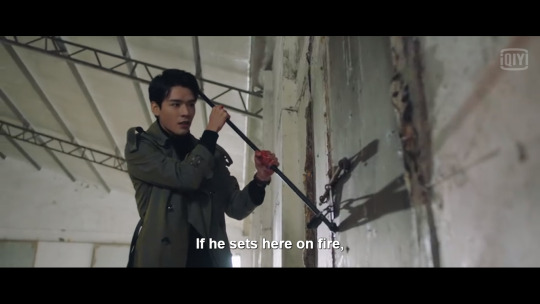
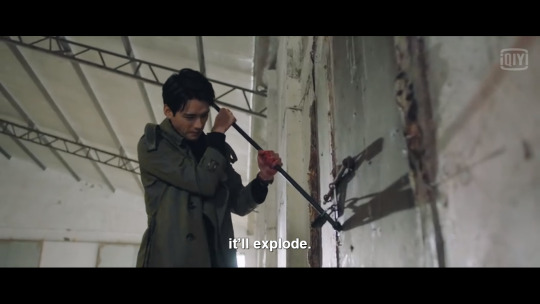
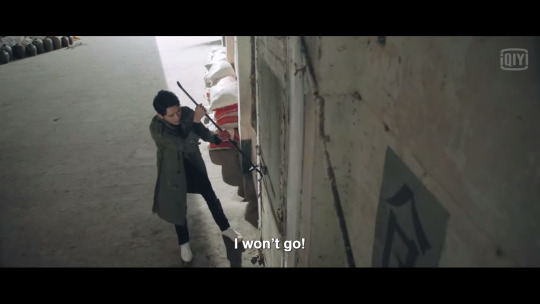
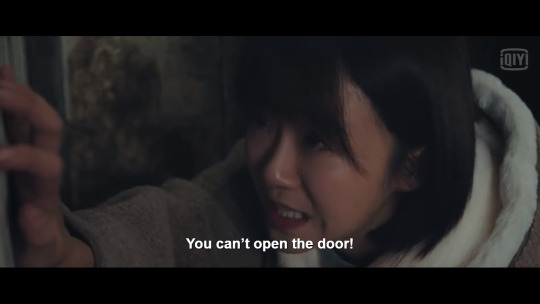
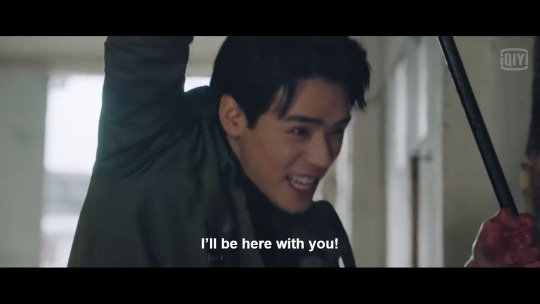



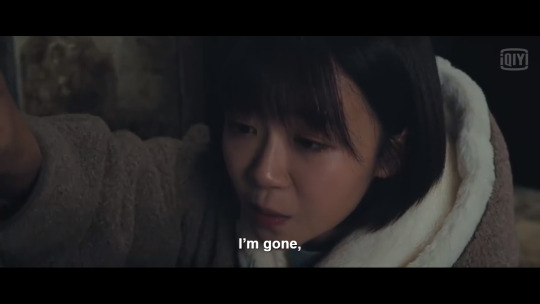

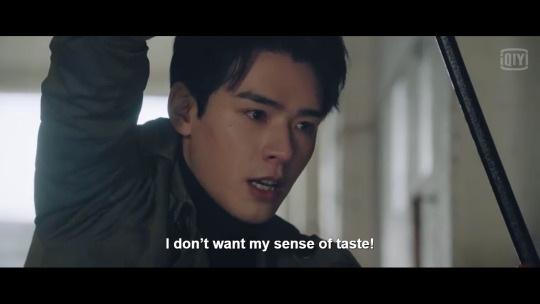


YES!! OMG I guess this makes worth it all 18 eps of nonsense I’ve seated through (tbh there has been a lot of ff). It’s stuff like this what makes me jump and swoon and fangirl about ships.
I mean, if it wasn’t clear enough that he had feelings for her, this definitely leaves zero room for doubt. Didn’t even need to say I love you, because he has said it all with “I only want you”. It’s just so intense and raw. Me loves it!
Also, the police does arrive (how convenient lol) and open the doors, Gong jun enters and just scoops his love (she’s so tiny) into his arms and gets the hell out of there, like a knight in a shiny armor:
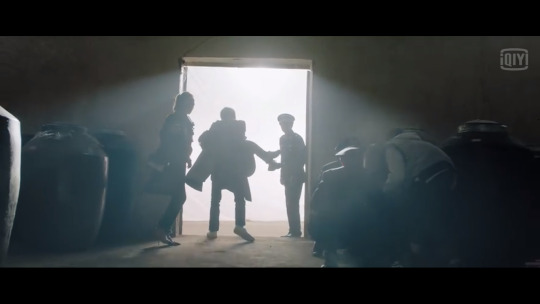
#flavour it's yours#gong jun#song yiren#cdrama#instead of tipsy why not get drunk#this reminded me of that scene in strong girl do bong soon#when she was trapped inside idk what and had a bomb attached to her#and park hyun sik's character was desperately trying to get her out#then he gives up and decides he will just die next to her#which was super hardcore !!!#so while this scene wasn't that powerful#it still delivered awesomeness for this fangirl
20 notes
·
View notes
Text
Episode 8 is one hella packed episode and it is an absolute joy to unpack it, beginning with this:
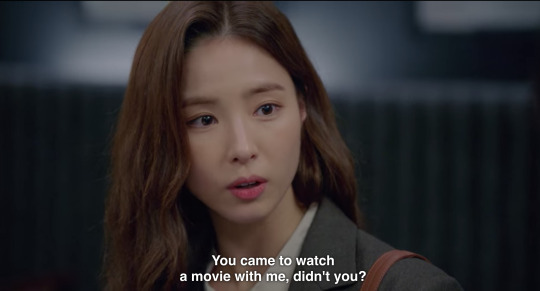
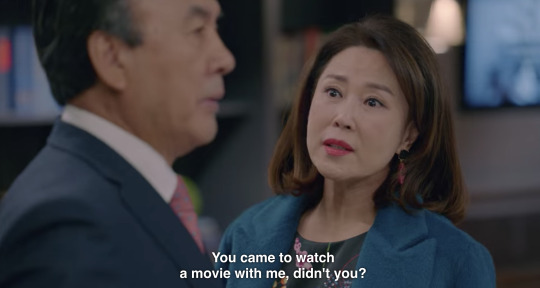
Clever, clever idea to have Ji-Woo repeat the line that Mi-Joo just said to indicate Ji-Woo is taking charge of things as far as Assemblyman Ki is concerned. It's also a good reminder of how tone and intent can change the meaning of a sentence even if the words are exactly the same (which is why we need good translators).
Seeing Mi-Joo stride across the screen with Seon-Gyeom behind her, it struck me that we've seen a variation of this many times before, beginning with the credit titles. While Seon-Gyeom is the sprinter, the one we see constantly trying to up the pace and charge ahead is Mi-Joo. She's always intent on moving ahead faster — perhaps to outrun the past that she finally makes peace with during the marathon? — while Seon-Gyeom moves at a slower pace, disentangling himself from the constraints of his troubled past and troubling father. The only one time we see him race ahead (in episode 2), we also see him come back and slow down.
What I particularly love about Park Shi-Hyun's writing is that in addition to all the layers and complexity she's written into the scenes and characters, she's also written a very, very funny show.
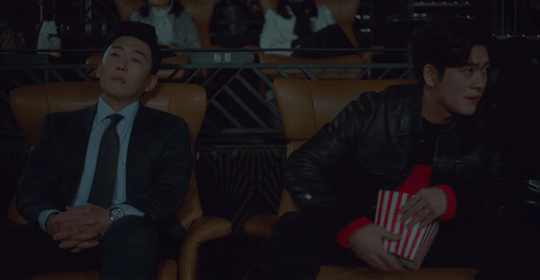
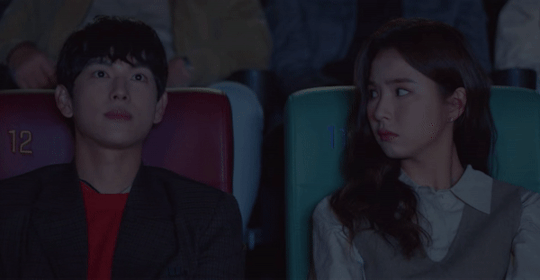
Both Shin Se-Kyung and Kang Tae-Oh do such a fantastic job with both the physical humour (without being over-the-top) and the timing that's needed to play up the wit in the dialogues. Not that Siwan and Soo-Young do a bad job — the scene in which Dan-Ah proposes to Seon-Gyeom is hilarious. My favourite is still May, who is very funny throughout this episode (the shot in which we learn she sleeps with her eyes open! GOLD).
The transitions in this episode are so well written. The insights from one scene ricochet off the next. For example, Dan-Ah in the scene at the bar — where she tells the bartender she can't risk keeping the book in her own study because she can't risk people guessing she has anxieties — gives us a look at the problems of the privileged. This is followed by a scene in which Yeong-Hwa and Mi-Joo discuss student debts, which is a relatable middle-class problem. This in turn is followed by Tae-Woong saying that he takes selfies because he's addicted to the validation he gets from the likes each of those photos gets him — a Gen Z problem. And so it is that we get a spectrum of problems that people face and hide behind performative façades.
The likes that Tae-Woong talks about pop up with manic frenzy at the end of the heartbreaking scene with Dan-Ah in the parking lot, presenting the viewer with a terrible contrast — driving away from him is the love and acceptance that he yearns for from a sister who (he hopes) knows him. All he has to hold on to is the superficial attention of the love professed by a fandom that doesn't really know him at all. Soo-Young's performance is fantastic in this scene, especially when she asks in a voice tinged with desperation why Tae-Woong keeps coming back to her despite her treating him so badly. For the first time, you realise how much it takes out of her to lash out at this desperately-sad boy. "It takes effort to hate someone," Tae-Woong tells her. My heart!
Another fantastic set of transitions comes later on in the episode, when Mi-Joo and May are unwinding at the end of a long day at the film shoot.
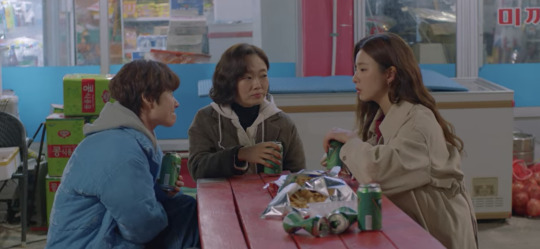
This is such a great example of writing inter-generational female friendships. When May remembers not being paid for working overtime, it's an acknowledgement that things are better for working women (especially in film) than it was before, but as Mi-Joo's experiences show, there's still a lot to be done because women are still driven by a certain insecurity and anxiety to push themselves way too hard (as we see a sick Mi-Joo do later in the episode).
Of course a man tries to break this gathering up — because he wants to go to bed. Superb excuse, particularly because these women are talking how much they have to work — and it is deeply satisfying to watch all three of them shut him down and establish their right to unwind.
This scene of female friendship is followed by one that shows the friendship between the three runners. Then we get to see a fight scene full of male actors. The machismo of that performance is a sharp contrast to the awkward tenderness of Woo-Sik and Yeong-Il's conversation.
While on the subject of toxic masculinity, this is the episode in which we find out Dan-Ah's father forged Myeong-Min's birth certificate to make him legally older than Dan-Ah even though he's actually 10 months younger than her. All to ensure he has a male heir. It's a nice detail that Myeong-Min's mother is the one laying out the memorial service for Dan-Ah's mother because it hints at a sense of solidarity.
Also dismantling traditional notions of masculinity is Seon-Gyeom, whom we see at his most domestic as he cooks and packs meals for May and Mi-Joo, and does chores around the house once they're gone. It's very much an inversion of the standard male-female gender roles with the woman going out to work and the man as the homemaker. To underscore this point, we see Seon-Gyeom consider the leopard-print shirt (that May and Mi-Joo hang to give strangers the impression they've got an alpha in the house) for a second before putting it away.
Speaking of alphas, Mi-Joo's really got a thing for wild cats. In addition to that shirt, her blanket is also a leopard-print and when we see her calling Seon-Gyeom, she's standing in front of a painting of a tiger. All these seem to be digs at her posturing that she's strong and invulnerable and I burst out laughing when Seon-Gyeom folds the leopard-print blanket while muttering, "I'd have guessed this is hers even if she hadn't told me."
As disinterested as Seon-Gyeom may be in films, they play a big role in sustaining him emotionally. In this episode, it's the film set that helps Mi-Joo and him come together after their stupid disagreement. Equally importantly, the film set is where he gets the time and space to reconnect with his mother.

Run On has so much fun being meta with the film bits. The film shoot within a drama is indeed an old fake.
There are two film sets we see in this episode — one with Ji-Woo and the other with Mi-Joo. While Ji-Woo's set feels relaxed, the one Mi-Joo's working in is chaotic and taxing. The two women are also at different ends of the professional spectrum. Ji-Woo is a star while Mi-Joo is not just working behind the scenes, but she's come to fill in for the person who was the juniormost member of the crew.
When pointing out the main players of their film crew to Mi-Joo and May, Hui-Jin describes the cinematographer as "a bit racist, but still a gentleman". (Mi-Joo's response is superb: "Weird.") It's an interesting choice to make the cinematographer racist because that's the crew member who decides how subjects and scenes will be framed. "Racist but a gentleman" feels like a precise summary of the orientalist perspective which (aside from being overwhelmingly masculine) shows the East through stereotypes that are often superficially beautiful, but also reductive and damaging. Not surprisingly, this cinematographer is the reason Mi-Joo flounders while translating on set.
The film set is also the first time that Seon-Gyeom sees Mi-Joo's vulnerable side when she falls ill. It's such a clever choice to have Mi-Joo stop performing in a setting that's all about performances. Not only does Mi-Joo give up the alpha act when she's sick, she admits to Seon-Gyeom that when she's feeling helpless, her instinct is to resort to a performative lie — calling out for mom because that's what she saw other kids do as a child in a sick ward (imagine how isolated and neglected she must have felt to do this. Also, she's felt this way so many times that this performance has become second nature to her).
The anecdote suggests Mi-Joo's mulish championing of her self has its roots in past incidents when she tried to fit and either failed or was rejected. And yet, for all her strength and confidence, she's chasing phantoms and has been doing so since she was a little girl. All because she was alone and didn't have anyone she could reach out to for help. Which is why what Seon-Gyeom tells her at the end of the episode is so relevant. He helps her to reorient.
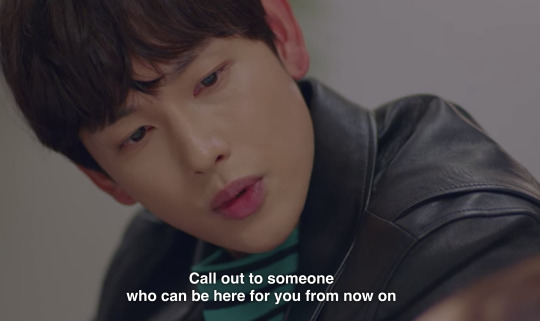
To which Mi-Joo, bless her leopard-print-loving heart, responds with
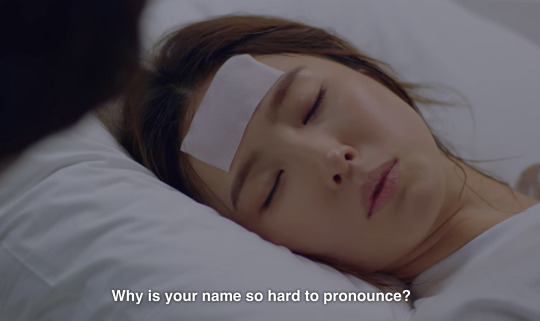
But my favourite part of this episode is the conversation that Ji-Woo has with Seon-Gyeom when he visits her set. First of all, Ji-Woo is playing a "vegan murderer", which is brilliant as ideas go and it's adorable how delighted she is about her violent roles.
I love how Run On doesn't punish Ji-Woo for sacrificing her family life for her work. Instead, it holds out the possibility that it is ok if you have that imbalance. In this scene, we see Ji-Woo's family reforming at the film set with Eun-Bi sending the coffee truck and Seon-Gyeom showing up just because Ji-Woo asked him to be there.
The mother-son conversation gives us a glimpse of Seon-Gyeom's bleak childhood and we learn that everything Seon-Gyeom did for his father was actually him doing what his mother had asked him to do. It comes as a surprise to Seon-Gyeom that his mother has noticed what he's suffered and that she understands how he'd hoped silently suffering would keep the family together. It's almost as though he's feeling seen for the first time.
Much like Dan-Ah, Ji-Woo may seem self-centred because of her ambitiousness, but she does notice what's happening beyond the obvious, especially when it comes to people she cares about. Both women are up against the worst of patriarchy. Also, I love that when she's talking about motherhood, Ji-Woo is blood-spattered — after all, being a working woman and a mother in a patriarchal is nothing short of fighting a war.
In previous episodes, it seemed as though Ji-Woo was the 'bad' (or at least not ideal) mother while Director Dong was the ideal, modern mother. Yet in comparison to how Director Dong later reacts to her son coming out, you can't help but feel Ji-Woo, with her unconditional support for her kids, might just be the better parent. What is great about Run On though is that that the script doesn't pit the two older women against each other as competing examples of motherhood or femininity. The point is that everyone's struggling, making mistakes and trying to learn from them. Ji-Woo is doing that and so will Director Dong eventually.
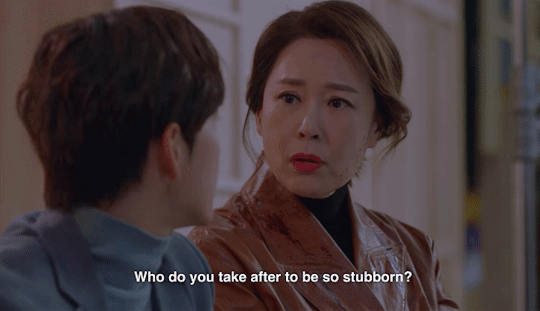
Love that the scene ends with Seon-Gyeom effectively declaring himself his mother's son. Take that, patriarchy.
88 notes
·
View notes
Text
The Best Korean Dramas on Netflix to Watch Right Now
https://ift.tt/3iIUp0r
South Korea is one of the world’s biggest exporters of popular culture. From K-pop to K-dramas, Parasite to BTS, the East Asian country knows how to reach an international audience. Korean TV, especially K-dramas, have long been of interest to western markets, but it’s no longer just the Korean diaspora or romance drama fans underserved by western markets checking out K-dramas, international watchers of Korean dramas have become much more “mainstream” in the last few years, especially with Netflix’s increased focus and investment in the region.
Read more
TV
Why Are Squid Game’s English-Language Actors So Bad?
By Kayti Burt
TV
Squid Game’s Most Heartbreaking Hour is Also Its Best
By Kayti Burt
Netflix has played a major role in this expansion of Korean TV into the global market. The streamer has not only scooped up an impressive backlog of Korean originals as a global distributor, but, since 2016, has been investing in the Korean TV industry at the production level. At the beginning of 2021, Netflix released an official statement announcing the leasing of two production facilities outside of Seoul, citing the move as “another important example of our continued commitment to investing in Korea’s creative ecosystem.” According to the release, from 2015 to 2020, Netflix invested over 700 million dollars in Korean content. The company also has multi-year content partnerships with CJ ENM/Studio Dragon and JTBC.
Suffice to say, Netflix has a solid Korean TV section, filled with some of the best K-dramas around, both new and old. If you’re new to the world of Korean TV or if you’re simply looking for your next watch, why not try out one of the following…
Crash Landing On You (2019)
The absolute top secret love story of a chaebol heiress who made an emergency landing in North Korea because of a paragliding accident and a North Korean special officer who falls in love with her and who is hiding and protecting her.
If you’re at all tapped into the K-drama scene, then you have at least heard of Crash Landing on You if not binged it multiple times. An original production from Netflix, Crash Landing On You pairs rom-com and character drama elements with an exploration of the cultural pain inherent in the separation between North and South Korea. With charismatic and vulnerable performances from veteran K-drama leads Son Ye-jin as South Korean heiress Yoon Se-ri and Hyun Bin as North Korean soldier Ri Jeong-hyeok; some gorgeous production values; and a memorably melodramatic soundtrack, Crash Landing On You is a whirlwind action-romance that was one of the best shows of 2020, full stop.
Kingdom (2019-present)
In a kingdom defeated by corruption and famine, a mysterious plague spreads to turn the infected into monsters. The crown prince, framed for treason and desperate to save his people, sets out on a journey to unveil what evil lurks in the dark.
If you prefer your TV more horror-driven, Korean TV has some notable shows for you. One of the most internationally popular is Kingdom, a historical zombie drama about a 17th century crown prince who has to fight against a mysterious plague of flesh-eating zombies that threatens to overtake his kingdom. Most K-dramas are structured to tell their entire story in one season, but Kingdom has already had two seasons with a third predicted to be on the way, as well as a one-off special that just premiered on Netflix called Kingdom: Ashin of the North. If you’re looking to get into a longer-running K-drama that favors horror over romance, this could be the one for you.
Squid Game (2021)
45.6 billion won. 456 contestants stake their lives on childhood games.
Unless you’ve been living under a rock, you’ve probably already heard of Squid Game, which is on track to become Netflix’s most popular series ever. The Korean social thriller tells the story of a group of 456 desperate contestants who agree to compete in a deadly competition for the chance to win the kind of money that could change their lives forever. Socially relevant and compulsively watchable, Squid Game takes a familiar premise and makes it new again with compelling characters, exquisite visual style, and cultural specificity.
Hometown Cha Cha Cha (2021)
When things go awry in the city, a dentist decides to go back to her quiet seaside hometown for a fresh start. There, she finds herself at odds with the village go-to handyman who’s always up to help and fix what’s broken—perhaps even matters of the heart.
If you’re looking for something a little chiller after the horrors of Squid Game, try Hometown Cha Cha Cha, which is basically a Hallmark Christmas movie in series form (which is to say a cozy romance). The series, which is currently “airing” weekly on Netflix, sees a big city dentist named Hye-jin decide to open an office in the small seaside town of Gongjin, where she once visited with her family as a child. It all happens on a bit of a whim, with Hye-jin not fully prepared for the transition to rural life in a town where everyone knows everyone’s business. Enter Du-sik, the town’s darling jack-of-all-trades, who helps the townspeople by doing any and every job they might need. The two couldn’t be more different, but fate seems to have brought them together. You probably have an idea of what happens next…
When the Camellia Blooms (2019)
Dong-baek (Kong Hyo-jin) is the owner of a small-town bar called Camellia. Her ordinary life turns topsy-turvy when three men enter her life — a good guy, a bad guy, and a miserly guy. What kind of stories will unfold in this sleepy town full of colorful characters?
If you’re looking for another K-drama set outside of Seoul, When the Camellia Blooms is the story of a single mom Dong-baek, who moves to the fictional town of Ongsan where she opens a bar called Camellia. When local police officer Yong-sik declares his love for Dong-baek, she is initially not interested, but the two become closer the more time they spend together. Thrown in a solid supporting cast and a serial killer subplot and you’ve got yourself one of the most popular K-dramas in recent years.
It’s Okay to Not Be Okay (2020)
Desperate to escape from his emotional baggage and the heavy responsibility he’s had all his life, a psychiatric ward worker begins to heal with help from the unexpected—a woman who writes fairy tales but doesn’t believe in them.
There’s still a taboo around addressing mental illness in Korea, which is one of the many reasons why this 2020 drama about Gang-tae, a young man who is a caregiver at a psychiatric hospital, and Moon-young, a children’s author living with antisocial personality disorder, made such a splash. While the romance at its center is great, It’s Okay to Not Be Okay really shines in its exploration of Gang-tae’s relationship with his brother, Sang-tae, who is on the autism spectrum. In a press conference promoting the show (via Metro Style), Sang-tae actor Oh Jung-se said of the character: “If you meet someone like Sang-tae, who is on the autism spectrum, on the street, I think it would be nice if people could think ‘I would like to be with that person’ instead of ‘I would like to help that person.’”
Boys Over Flowers (2009)
Unassuming high school girl Jan-di stands up to — and eventually falls for — a spoiled rich kid who belongs to the school’s most powerful clique.
A K-drama classic, Boys Over Flowers follows working class student Geum Jan-di as she arrives at the elite Shinhwa High School on scholarship, only to meet and be unimpressed by a group of privileged boys known collectively as F4 who rule the school. The drama follows Jan-di as she goes from bullying target of F4 leader Jun-pyo to the object of his obsession. It’s a classic enemies-to-lovers set-up, and one that while cliche, is still worth a watch over a decade later, especially if you’re interested in checking out one of the most iconic K-dramas of all time.
Itaewon Class (2020)
On the vibrant streets of Itaewon, something is about to shake up the local food scene. Going up against the most powerful conglomerate in the industry, underdog Park Sae-ro-yi and his band of determined misfits seek to take over Itaewon and turn their ambitious dreams into reality.
Korean TV knows how to melodrama, and this story of revenge and romance set in Seoul’s popular Itaewon area leans into intense catharsis. Itaewon Class follows Park Sae-Ro-Yi, the owner of an up-and-coming Itaewon restaurant called DanBam that becomes a refuge for a group of social outcasts. Together, they work to take down the same business mogul responsible for the death of Sae-Ro-Yi’s father years earlier. Itaewon Class was extremely popular both in South Korea and internationally, and featured the first transgender character in a mainstream K-drama. Added bonus: the Itaewon Class soundtrack includes an original song from BTS’ V.
Mr Sunshine (2018)
In 1905, a Korean American U.S. marine officer returns to his homeland on a diplomatic assignment. Coping with his painful past in Korea as an orphaned servant boy, he finds himself in a complicated relationship with an aristocrat’s daughter.
If you’re into historically-driven period drama, then check out the beautifully-shot Mr. Sunshine. The K-drama is set in the late 19th and early 20th century in Hanseong, the city that would become Seoul and follows activists fighting for Korea’s independence. The story follows Go Ae-shin, an orphaned noblewoman who trains to be a sniper in the Righteous Army, the civilian militia that fought against the occupying Japanese forces, and Eugene Choi, a man who escaped slavery in Korea to become a U.S. marine, only to return to his homeland where he falls in love with Ae-shin. The series uses real-life history, including Shinmiyangyo, the Spanish-American War, the assassination of Empress Myeongseong, the Russo-Japanese War, Gojong’s forced abdication, and the Battle of Namdaemun as a backdrop for its epic story.
Signal (2016)
A cold-case profiler in 2015 and a detective in 1989 work together to solve a series of related murders spanning three decades using a special walkie-talkie to communicate with each other.
This premise has been used a lot—from 2000 Dennis Quaid/Jim Caviezel thriller Frequency to the 2016 CW TV adaptation of the same name—and for good reason. An analog device allows two people to communicate across time, and they must work to solve a murder together. It not only makes for compelling character drama, as two people become closer but are separated by years, but also is a fresh twist on the serial killer narrative. In K-drama Signal, the analog device is a walkie-talkie, and the characters on either temporal side of it are contemporary criminal profiler Park Hae-young and 1989-based Detective Cha Soo-hyun. If you’re looking for a good crime thriller, Signal could be it.
Hospital Playlist (2020-present)
Friends since undergrad school, five doctors remain close and share a love for music while working at the same hospital.
Like Kingdom, Hospital Playlist is the rare K-drama that tells its story across multiple seasons. The hospital drama just finished airing its second season weekly on Netflix, continuing its story about a group of doctors in their 40s who have been best friends since medical school. A true ensemble drama, Hospital Playlist is perfect for fans of Grey’s Anatomy but feels unique in its centering of a friend-group with a such a long history.
Vincenzo (2021)
Bringing his mafia past back with him to South Korea, Song Joong-ki stars as notorious Italian lawyer Vincenzo who isn’t afraid to lend his bloodstained hands to beat the untouchable conglomerates in their own game.
If you just watched the dramatic opening of Vincenzo, set in Italy days after the death of a mafia boss, you might think you’re in for a self-serious organized crime drama. But the Netflix K-drama quickly shifts into a story much more tonally complex. Part romance, part drama, part action thriller, Vincenzo has something for everyone. It follows Vincenzo (Space Sweepers‘ Song Joong-ki), a Korean lawyer raised by an Italian mafia family who must flee the country following his father’s death. As part of his plan of escape, Vincenzo travels to Korea to recover a stash of hidden gold under an old apartment building set for demolition by a corrupt corporation called the Babel Group. Because of this dilemma, Vincenzo becomes unlikely allies with the group of eccentric citizens who live in the building, as well as with a passionate and moral lawyer who has a vendetta against the Babel Group for his own reasons.
The “Reply” Series (2012-2016)
Take a nostalgic trip back to the late 1980s through the lives of five families and their five teenage kids living in a small neighborhood in Seoul.
The Reply series is one of the most popular cable dramas in Korean TV history. It launched in 2012 with Reply 1997 before continuing with Reply 1994 in 2013 and Reply 1988 in 2015. The ambitiously-structured series follows a group of friends and their kids, telling the story in present-day in addition to flashbacks. Featuring a fun soundtrack, as well as some incredibly performances, the Reply series is well worth a watch for anyone who loves character drama with a nostalgic twist.
Prison Playbook (2017)
With only days before his major league baseball debut, pitcher Kim Je-hyeok unexpectedly lands himself behind bars. He must learn to navigate his new world with its own rules if he wants to survive.
Prison Playbook is much more slow-paced than many of the selections on the list, but this character drama is worth the dedication. Though it’s often touted as a “black comedy,” it’s much more tonally light than that suggests, despite the subject matter. The story follows baseball pitcher Kim Je Hyeok, who is incarcerated days before his major league debut for assaulting the attempted rapist of his sister. It follows his life within prison, along with the lives of some of the other inmates and guards, including his old best friend, Lt. Lee Joon Ho, who is a correctors officer. Created by Lee Woo-jung, who also made the aforementioned Reply series, Prison Playbook is one of the most popular K-dramas in Korean cable history ever.
cnx.cmd.push(function() { cnx({ playerId: "106e33c0-3911-473c-b599-b1426db57530", }).render("0270c398a82f44f49c23c16122516796"); });
Sweet Home (2020)
As humans turn into savage monsters, one troubled teenager and his neighbors fight to survive and to hold onto their humanity.
It’s been well-documented that Song Kang is a K-drama darling. The actor has appeared in many a romantic K-drama, including Netflix’s Nevertheless and Love Alarm. Sweet Home, however, is his rare horror appearance, and it’s well worth a watch just to see Song in a completely different context. Of course, this apocalyptic horror story has other qualities too, and holds the honor of being the first Korean series to enter the U.S. Netflix Top Ten. Based on a Naver (aka Korean Google) webcomic of the same name, Sweet Home follows Cha Hyun-soo (Song), a high school student who moves into an apartment building after the deaths of his parents, only to discover that the building also happens to be the home of a species of monsters set on world domination.
Nevertheless (2021)
Like a butterfly hopelessly attracted to a flower, this art student can’t seem to resist the mysterious young man who captures her attention. But the more they get romantically involved, the sooner she will have to decide—will getting close be worth it, when he doesn’t believe in relationships?
Speaking of Song Kang… Nevertheless is the latest K-drama to star the 27-year-old actor. The romantic drama stars Han So-hee as Yoo Na-bi, university art student who no longer believes in love following discovering her boyfriend has been cheating on her. When she meets Song’s Park Jae-eon, she is immediately intrigued. Though the two share an immediate attraction, they resist entering into a relationship due to their respective uncertainties about love. Based on a popular webcomic of the same name, Nevertheless feels unique in its treatment of modern dating life in Korea, depicting some of the more realistic, often internal struggles of what its like to date in your 20s.
My Mister (2018)
In a world that is less than kind, a young woman and a middle-aged man develop a sense of kinship as they find warmth and comfort in one another.
If you’re in the mood to cry, try My Mister, a drama about a financially-disadvantaged young woman just trying to stay afloat as she takes care of her sick grandmother amid mounting debt and a much more financially-privileged middle-aged man who is also being crushed by the weight of his life. The two work together, and form a (mostly) platonic relationship that helps both of them heal. Understated and deeply emotional at the same time, My Mister will subvert so many K-drama expectations in clever ways.
Memories of the Alhambra (2018)
While looking for the cryptic creator of an innovative augmented-reality game, an investment firm executive meets a woman who runs a hostel in Spain.
If you’re looking for another K-drama starring Crash Landing on You‘s Hyun Bin (and of course you are), then look no further than Memories of the Alhambra, a 2018 K-drama with an absolutely batshit (read: amazing) premise. Hyun stars as Yoo Jin-woo, a CEO who travels to Spain in search of the creator of an AR game set in the Spanish medieval fortress Alhambra. Once there, Jin-woo is pulled into a reality-bending mystery with life-or-death stakes and some unpredictable twists that I don’t want to spoil for you.
Romance is a Bonus Book (2019)
A gifted writer who’s the youngest editor-in-chief ever at his publishing company gets enmeshed in the life of a former copywriter desperate for a job.
Ostensibly based on the TV series Younger, Romance is a Bonus Book is a rom-com set in the publishing industry world. It follows single mom Kang Dan Yi as she struggles to reenter the workforce following her divorce. When he lies about her background to get a job, her life becomes tangled up with childhood friend and publishing phenom Cha Eun Ho.
I began watching this series to see how it compared to the U.S. version of the show, of which I am a fan. Honestly, these two series have only the most superficial details of their plots in common, which is par for the course in many adaptations. Romance is a Bonus Book is much more romance-centric than Younger, which balances the love life of its central protagonist with the many other relationships and concerns she has in her life. But that isn’t a bad thing. They are two very different shows with their own interests and strengths, but if you’re a fan of both rom-coms and the publishing industry, then both Romance is a Bonus Book and Younger are worth a watch.
Black (2017)
A man possessed by death. A woman who can see death. The earthly and the afterworld collide dangerously.
One character is possessed by the Grim Reaper. The other can see deadly spirits. Only Korean can turn this premise into a heartbreaking romance, as the two work together to save people marked for death. If you’re looking for a spooky season watch, you can’t go wrong with Black, which is a delightful (and, honestly, pretty complex) hodgepodge of Korean horror all wrapped up in a rom-com package.
What is your favorite K-drama on Netflix? And what upcoming Netflix K-dramas are you most looking forward to? Let us know in the comments below?
The post The Best Korean Dramas on Netflix to Watch Right Now appeared first on Den of Geek.
from Den of Geek https://ift.tt/3ruYuZf
6 notes
·
View notes